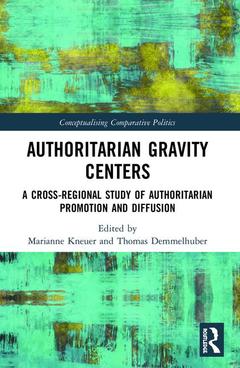Authoritarian Gravity Centers A Cross-Regional Study of Authoritarian Promotion and Diffusion Conceptualising Comparative Politics Series
Coordonnateurs : Kneuer Marianne, Demmelhuber Thomas

Autocracies not only resist the global spread of democracy but are sources of autocratic influence and pressure. This book presents a conceptual model to understand, assess, and explain the promotion and diffusion of authoritarian elements.
Employing a cross-regional approach, leading experts empirically test the concept of authoritarian gravity centers (AGCs), defined as "regimes that constitute a force of attraction and contagion for countries in geopolitical proximity." With an analysis extending across Latin America, the Middle East, Eastern Europe, Central Asia, and Asia, these AGCs are shown to be effective as active promoters (push) or as neutral sources of attraction (pull). The authors contend that the influence of exogenous factors, along with international and regional contexts for the transformation of regime types, is vital to understanding and analyzing the transmission of autocratic institutional settings, ideas, norms, procedures, and practices, thus explaining the regional clustering of autocracies. It is the regional context in which external actors can influence authoritarian processes most effectively.
Authoritarian Gravity Centers is a vibrant and comprehensive contribution to the growing field of autocratization, which will be of great interest to undergraduate and postgraduate students of comparative area studies, illiberalism, international politics, and studies of democracy.
Part I: Concept 1. Autocratization and its Pull and Push Factors – A Challenge for Comparative Research 2. Conceptualizing Authoritarian Gravity Centers: Sources and Addressees, Mechanisms and Motives of Authoritarian Pressure and Attraction Part II: Empirical Studies on Authoritarian Gravity Centers 3. Kingdom of Gravity: Autocratic Promotion and Diffusion in Saudi Arabia 4. Democratic Erosion and Autocratization in Latin America: The Role of Venezuela as an Authoritarian Gravity Centre 5. Kazakhstan: A Possible Future Authoritarian Gravity Centre? Part III: The International Dimension of Authoritarianism Revisited 6. Russia’s Effects on a Consolidated Democracy: The Erosion of Democracy in Hungary and the Putin Model 7. Iran and its Neighbors: Military Assistance as Support for Authoritarianism 8. Networking with Chinese Characteristics: China’s Party-to-Party Relations in Asia 9. Spreading Cyber-Autocracy? The Shanghai Cooperation Organization and the Diffusion of Norms of “Internet Sovereignty” Part IV: Authoritarianism Gravity Centres in Cross-Regional Comparison 10. Authoritarian Gravity Centres in Cross-Regional Comparison: Future Studies and the International Dimension of Authoritarianism
Marianne Kneuer is Professor for Political Science, Director of the Institute of Social Sciences at the University of Hildesheim, Germany and current President of International Political Science Association (IPSA). Her research interests include studying comparative regime studies, quality of democracy, and democratization, especially the international dimension of democratization and of autocratization.
Thomas Demmelhuber is Professor of Middle East Politics and Society at the Friedrich-Alexander-University of Erlangen-Nürnberg, Germany. Demmelhuber’s research focuses on state, power, and politics in the Middle East from a comparative perspective, including that of international actors such as the European Union.
Date de parution : 12-2021
15.2x22.9 cm
Date de parution : 07-2020
15.2x22.9 cm
Thème d’Authoritarian Gravity Centers :
Mots-clés :
Mongolian National Democratic Party; Authoritarian Diffusion; Comparative Politics; MPRP; Democracy; Autocracy Promotion; Democratization Studies; TCP; Authoritarianism; Chinese Communist Party; Autocratization; Bertelsmann Transformation Index; Autocratic Regimes; GCC Member; Autocracy; GCC State; Illiberalism; CCP; Authoritarian Gravity Centers (AGC); UN; Target States; Geopolitical Proximity; Political Ideologies; Democratic Erosion; International Politics; Chinese Government; Regime Studies; Central Asian Countries; Comparative Area Studies; SCO Member State; Diffusion; SCO Member; October 2017a; autocratic institutional settings; October 2017b; authoritarian gravity centers; Iraqi Shiites; Putin Model; Bolivarian Revolution; Single Member District; Civil Society; CAS



